By Dennis Jensen
At an assemblage of physicists at the British Association in 1900, one of the 19th Century’s most influential physicists and mathematicians, Lord William Thomson Kelvin said, “There is nothing new to be discovered in physics now. All that remains is more and more precise measurement.”
This statement appears myopic today and would certainly be lambasted by the likes of Einstein, Schrödinger and Hawking.
Arguments by the Gillard government that the science of climate change is “settled” and “the debate is over” are not dissimilar and will leave future generations in no doubt Labor is using flawed science to drive this tax grab.
Science is all about asking the right questions. If we went back 1000 years we could answer every scientific question someone might have, based on knowledge of the day. However, follow-up questions would lead to a point where we would not yet have discovered definitive answers. Such is the nature of science. Asking the wrong question or one with the presumption of a result fails to respect scientific practice and leads to answers that history will judge as misguided and unscientific.
The Intergovernmental Panel of Climate Change has been asked the wrong question. Its mission statement reads in part,
The role of the IPCC is to assess on a comprehensive, objective, open and transparent basis the scientific, technical and socio-economic information relevant to understanding the scientific basis of risk of human-induced climate change.
The IPCC has presumed anthropogenic factors as the cause of climate change.
A carbon tax is held by the Gillard government as the definitive climate change cure. But this answer comes from questions based on science that is contentious and literature that is outdated.
Independent Scientists have identified flaws in the computer models that form the basis for the IPCC’s 2007 global warming predictions. IPCC vice chairman, Professor Jean-Pascal van Ypersele has conceded there “probably would be mistakes” in a larger report scheduled for 2013-14. The Royal Society states, “There is little confidence in specific projections of future regional climate change, except at continental scales.” The French Academy of Sciences as well says the jury is still out regarding the indirect effects of carbon dioxide and other greenhouse gases produced by human activity.
Bryan Leyland, spokesman for the New Zealand Climate Science Education Trust said when referring to a High Court case against the National Institute of Water and Atmospheric Research and its national climate data,
Many scientists believe that, although the earth has been in a natural warming phase for the past 150 years, it has not heated as much as Government archives claim. The precise trend figure is extremely important, as it forms the sole basis of the claim that human activities are the dominant cause of the warming.
The Federal Government must review its position along with the climate scientists of the world. If it continues down the path of carbon tax, history will judge this solution as unscientific and financially unviable.
An assessment of some of the history of physics demonstrates how dangerous it can be to assume that you have all the answers. In the late 17th century probably the greatest physicist- mathematician of all time, Isaac Newton, derived laws for motion and gravitation. These laws were accepted as the definitive solution for a period of two centuries and the term ‘laws’ was applied to his work rather than ‘theories’. This was despite some exceptions such as the orbit of Mercury that could not be explained using these laws.
Einstein, with his Special and General Theories of Relativity provided a far more complete understanding of mechanics and gravitation but Relativity is still called a ‘theory’. It was realised that Newton’s Laws in fact represented a special case of more generalised theories. When Einstein won the Nobel Prize for Physics, it was not for Relativity, a theory that overturned centuries of ‘accepted fact’. Rather it was for the Photoelectric Effect, a far less confronting discovery for the scientific establishment.
If you had asked astrophysicists only 20 years ago whether the rate of expansion of the universe was speeding up or slowing down, they would have said slowing down. Imagine the surprise when it was discovered that the rate of expansion was increasing. This overturned decades of fundamental forces understanding; gravitation, electromagnetic, nuclear strong and nuclear weak forces. To attempt to explain this, we now have the concept of ‘dark energy’ to accompany ‘dark matter’, both of which were unknown 40 years ago.
The fact is in terms of complexity, mechanics, gravitation and astrophysics have nothing on the dynamics of the climate system.
So why are we so comfortable with “the science is settled” argument?
Why do journalists such as Jon Faine see themselves and the “consensus science” as so omnipotent that they refuse to engage with sceptics or countenance scepticism?
When ‘accepted science’ has massive implications for the welfare of a nation, there needs to be a very thorough audit of the science.
This is why I am calling for a Royal Commission into the science of climate change and the roles played by the CSIRO and the Bureau of Meteorology.
Australia’s climate change policies must be based on our best understanding of the latest scientific research coupled with assessment of the relevant economics impacts.
As The International Climate Science Coalition notes:
Attempts by governments to legislate costly regulations on industry and individual citizens to encourage CO2 reduction will slow development while having no appreciable impact on the future trajectory of global climate change.
Such policies will markedly diminish future prosperity and so reduce the ability of societies to adapt to inevitable climate change, thereby increasing, not decreasing human suffering.
A Royal Commission into the science of climate change will allow an honest public debate, free of emotion, based on the evidence.
History demonstrates the science is not “settled” and never will be. Only a Royal Commission into the science of climate change will provide the most climate effective and cost effective solutions in this debate.
Dr. Dennis Jensen is the Federal Member for Tangney
By Louise Gray, Environment Correspondent
Global warming is now such a serious threat to mankind that climate change experts are calling for Second World War-style rationing in rich countries to bring down carbon emissions.

In a series of papers published by the Royal Society, physicists and chemists from some of world’s most respected (HA!) scientific institutions, including Oxford University and the Met Office, agreed that current plans to tackle global warming are not enough.
Unless emissions are reduced dramatically in the next ten years the world is set to see temperatures rise by more than 4C (7.2F) by as early as the 2060s, causing floods, droughts and mass migration.
As the world meets in Cancun, Mexico for the latest round of United Nations talks on climate change, the influential academics called for much tougher measures to cut carbon emissions.
In one paper Professor Kevin Anderson, Director of the Tyndall Centre for Climate Change Research, said the only way to reduce global emissions enough, while allowing the poor nations to continue to grow, is to halt economic growth in the rich world over the next twenty years.
This would mean a drastic change in lifestyles for many people in countries like Britain as everyone will have to buy less ‘carbon intensive’ goods and services such as long haul flights and fuel hungry cars.
Prof Anderson admitted it “would not be easy” to persuade people to reduce their consumption of goods.
He said politicians should consider a rationing system similar to the one introduced during the last “time of crisis” in the 1930s and 40s.
This could mean a limit on electricity so people are forced to turn the heating down, turn off the lights and replace old electrical goods like huge fridges with more efficient models. Food that has travelled from abroad may be limited and goods that require a lot of energy to manufacture.
“The Second World War and the concept of rationing is something we need to seriously consider if we are to address the scale of the problem we face,” he said.
Prof Anderson insisted that halting growth in the rich world does not necessarily mean a recession or a worse lifestyle, it just means making adjustments in everyday life such as using public transport and wearing a sweater rather than turning on the heating.
“I am not saying we have to go back to living in caves,” he said. “Our emissions were a lot less ten years ago and we got by ok then.”
The last round of talks in Copenhagen last year ended in a weak political accord to keep temperature rise below the dangerous tipping point of 2C(3.6F).
This time 194 countries are meeting again to try and make the deal legally binding and agree targets on cutting emissions. At the moment efforts are focused on trying to get countries to cut emissions by 50 per cent by 2050 relative to 1990 levels.
But Dr Myles Allen, of Oxford University’s Department of Physics, said this might not be enough. He said that if emissions do not come down quick enough even a slight change in temperature will be too rapid for ecosystems to keep up. Also by measuring emissions relative to a particular baseline, rather than putting a limit on the total amount that can ever be pumped into the atmosphere, there is a danger that the limit is exceeded.
“Peak warming is determined by the total amount of carbon dioxide we release into the atmosphere, not the rate we release it in any given year,” he said. “Dangerous climate change, however, also depends on how fast the planet is warming up, not just how hot it gets, and the maximum rate of warming does depend on the maximum emission rate. It’s not just how much we emit, but how fast we do so.”
Other papers published on ‘4C and beyond’ in Philosophical Transactions of the Royal Society A warned of rising sea levels, droughts in river basins and mass migrations.
Icecap Note: What a bunch of garbage from the formerly great Universities and societies. CO2 is a great benefit to mankind and presents absolutely no threat to the planet. On the other hand the measures these clowns in the Universities, professional societies, UN, enviro groups and the governments advocate would result in the death of many millions of people and rob future generations of the great advances technology and available energy would bring.
By Tom Nelson Blogspot
BBC News - Met Office says 2010 ‘among hottest on record’
Professor John Christy, a climate sceptic from the University of Alabama in Hunstville, said global temperature had plunged in the past two weeks, so 2010 was likely to remain in second place.
He challenged the Met Office conviction that greenhouse gases were to blame for the warmth.
“The cause of the warmth is speculation. There are numerous feedbacks at work (many of which are poorly modelled if at all), and it seems to me unimaginative to conclude that greenhouse gases are the dominant cause,” he said.
“There is no proof of such a cause in classical scientific sense - so we end up with a lot of opinions on the matter. Evidence is strong that centuries in the past 10,000 years were warmer than today without influences from human-related greenhouse gases.”
San Diego has one of coldest November nights in years - SignOnSanDiego.com The temperature fell to 43 degrees at Lindbergh Field at 4 a.m. today, tying the record for November 26th, which was set in 1884. Thanksgiving cold breaks records across Calif. - Forbes.com Californians are hoping for a warmer weekend after a Thanksgiving cold snap broke or tied cold-temperature records - some more than a century old - up and down the state. The National Weather Service reports that San Francisco’s low of 42 degrees on Thursday tied a record set back in 1892. Across the bay in Oakland, 36-degree daytime temperatures shattered the old record of 42.
Record low temps lead to power outages - Columbia Basin Herald: Latest News. Early Wednesday temperatures broke records around the Columbia Basin region as temperatures measured well below the freezing mark.
In Calgary temperatures last week reached record lows, nearing -40C/-40F.
Tuesday’s lows in Alberta:
Calgary Springbank Airport -36.5C
Rocky Mtn. House -37.8C (Record)
Edmonton International Airport -34.9C (Record)
Red Deer -35.3C (Record)
Sundre (North America’s cold spot) -39.3C (Record)
Snow chaos as -7.8C freeze grips Britain | The Sun |News
The Arctic blast is already the worst November weather in 17 years and experts now say it could last up to TWO WEEKS. The Met Office added: “It’ll turn colder still next week. Snow will spread and we could get 10in on high ground in the South.” Last month the UK met Office once again predicted a mild winter as they did last year when the UK suffered the coldest and snowiest in 32 (England) to 48 years (Scotland)
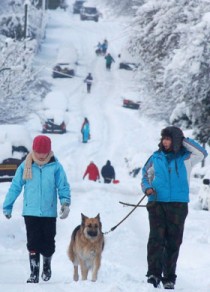
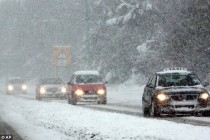
Police are advising motorists to stay off the roads as parts of Britain get set for 15 inches of snow
Read more here.
And P Gosselin reports that snow comes to China 40 days early here.
According to China.org.cn:
Snow storms has hit four towns in Xing’an Prefecture, a pasture region about 1,500 km northeast of the regional capital, Hohhot, since last Saturday. Snow has accumulated up to 30 cm deep in most parts of the region and a meter in some areas.
The snow was 40 days earlier than its usual arrival time and was the heaviest in 30 years. At least 700 heads of livestock are believed to have died in the storm.
By Julia A. Seymour
It’s been a year since thousands of emails and files were leaked from a prominent climate science group at the University of East Anglia, with startling comments including this one: “We can’t account for the lack of warming at the moment.”
Other leaked emails showed potential manipulation of temperature data, a willingness to destroy information rather than release it under the British Freedom of Information (FOI) law and the intimidation of publications willing to publish skeptical articles. The files also indicated that the temperature data was in a “hopeless” state.
Even though many considered it a huge scandal, the three broadcast networks didn’t think so. They ignored the story for roughly two weeks, and have only mentioned it in a dozen stories in the past year. In those few stories network reporters often downplayed the allegations against climate scientists by calling them “mistakes” or a “series of gaffes,” others sympathized with the accused scientists or insisted that the science supporting global warming alarmism was solid. Journalists even accepted “whitewash” investigations into the matter that supposedly “exonerated” the climate scientists.
The scandal over those leaked files was dubbed ClimateGate and dominated headlines - particularly in Britain. But here in the U.S., the three broadcast networks went on as if nothing had happened for nearly 14 days.
It wasn’t until the evening of the 14th day that one network program, NBC “Nightly News,” finally reported on the climate science controversy. But that first story was not the beginning of a flood of network coverage of ClimateGate. Since Nov. 19, 2009, the broadcast networks have only mentioned the scandal or the University of East Anglia in a paltry 12 stories.
Twelve stories. Why so little coverage? Myron Ebell, director of energy and global warming policy for the Competitive Enterprise Institute (CEI), told the Business & Media Institute, “I think it’s pretty obvious why the networks and major papers have ignored ClimateGate. It’s because they don’t want to consider the possibility that the sort of monolithic [global warming] consensus that they support and are a part of is based on junk science.”
CBS’s Wyatt Andrews defended alarmist scientists against accusation of “fraud” saying “if that’s true, it’s a fraud adopted by most of the world’s leading scientists” Similarly, NBC’s Anne Thompson cited “experts” to bolster global warming science on Dec. 6, 2009, saying “They say it doesn’t matter what’s in those emails. The Earth is changing.”
On May 23, 2010, ABC “World News” presented ClimateGate scientists including Penn State’s Michael Mann as the victims. Dan Harris said the debate about climate had become “increasingly venomous with many prominent climate scientists now saying that they are being severely harassed.”
According to Ebell, the scientists involved were not making “mistakes” as the media emphasized, but “manipulating data.” The CRU emails revealed “they were adjusting the [weather] stations they were using” to show warmer recent decades and cooler temperatures in the 1930s and ‘40s, Ebell said.
Exonerated by the Media
The allegations of tampering with data, hiding “the decline,” evading FOI laws or trying to keep skeptics from being published didn’t matter to the networks, which had been airing stories about the threat of climate change for years. Reporters were adamant that the science was valid and the threat was real.
Anne Thompson told NBC viewers Dec. 7, 2009, “But does the controversy change the science? A team of explorers will present findings on Arctic ice melt in Copenhagen, findings that have nothing to do with the emails.”
Over on CBS, Wyatt Andrews listed a number of scientific groups that accept manmade global warming as fact “To most of them, ClimateGate is a sideshow compared to one overwhelming fact.”
As the findings of so-called “independent” investigations came out in 2010, many in the news media claimed the climate scientists had been “exonerated.”
Dan Harris used that word on May 23, 2010 saying: “Senator Inhofe’s report was referring to an incident late last year known as ClimateGate, where stolen emails gave the impression that climate scientists may have been trying to hide flaws in their research, although several subsequent investigations have exonerated the scientists.”
USA Today, The New York Times, The Washington Post, CNN and many other U.S. and international media outlets reported that the most recent British inquiry (the Muir Russell inquiry) “cleared scientists of any misconduct.”
But the Post and many other outlets didn’t mention crucial indications that the so-called “independent” investigations were a “whitewash.” Cato Institute Senior Fellow Pat Michaels wrote an op-ed for The Wall Street Journal July 12 cautioning people, “Don’t believe the ‘independent’ reviews.”
Michaels, who was a professor of environmental sciences at the University of Virginia (UVA) from 1980 to 2007, pointed out that Muir Russell’s panel named “The Independent Climate Change E-mails Review” was in fact “commissioned and paid for by the University of East Anglia (UEA), the same university whose climate department was under investigation.”
That would be like BP handpicking and paying a panel of experts to investigate its handling of the oil spill. Would the news media take that panel seriously if it “exonerated” BP? Not likely.
Public Perception of Climate Change Shifts after Climate Scandal
Despite very little network coverage, and claims from some media outlets that the scientists in question had been cleared, public faith in the threat of global warming has been dropping since the email scandal erupted. Rasmussen reported on Nov. 15, 2010 that only 61 percent of people think global warming is a “somewhat serious problem.” “These findings have steadily dropped since last November when the so-called ‘Climategate’ scandal broke,” Rasmussen said. The polling group also found 45 percent of people attributed warming to “long-term planetary trends.”
In March 2010, Gallup found that 48 percent of Americans thought the threat of global warming was “generally exaggerated.” That was the highest in 13 years, according to Gallup.
In the wake of ClimateGate (and other subsequent climate science scandals), British journalist James Delingpole wrote that, “AGW theory is toast. So’s Dr. Rajendra Pachauri. So’s the Stern Review. So’s the credibility of the IPCC. But if you think I’m cheered by this you’re very much mistaken. I’m trying to write a Climategate book but the way things are going by the time I’m finished there won’t be anything left to say: the battle will already have been won and the only people left who still believe in Man Made Global Warming will be the eco-loon equivalents of those wartime Japanese soldiers left abandoned and forgotten on remote Pacific atolls.”
Networks Hide Climate Scandals
Around Earth Day 2010, the Business & Media Institute released a Special Report about network bias surrounding the ClimateGate scandal and other related scandals. BMI found that not only did the networks ignore the story for nearly two weeks, they buried allegations against climate scientists with six times as many global warming alarmism reports (86 to 13).
In those stories, reporters warned about the potential end of French wines, the threat of rising sea levels, melting Andes glaciers, worsening allergies, floods, droughts, dengue fever and the danger posed to animals from the Arctic Fox to Atlantic salmon. Read story here.
World Climate Report
As Americans sit down on Thursday and give thanks for the food on their table, hopefully many will say a good word for enhanced atmospheric carbon dioxide levels, as much of the foodstuff filling their plates will have benefited from the anthropogenically-elevated CO2 levels in the air.
And even if we don’t produce the food ourselves, we contribute to the growth of crops around the world through emissions of CO2 whenever we use energy derived from fossil fuels - a large component of the energy that we use to power our daily lives.
Renown plant researcher Dr. Sylvan Wittwer put it this way in his enlightening book Food, Climate and Carbon Dioxide:
[T]he effects of an enriched CO2 atmosphere on crop productivity, in large measure, are positive, leaving little doubt as to the benefits for global food security. It is, therefore, inappropriate for public discussion of the issue to focus only on the hypothetical dangers of global warming that might result from higher CO2 levels. It is equally important to stress the known benefits.
The rising level of atmospheric CO2 is a universally free premium, gaining in magnitude with time, on which we can all reckon for the foreseeable future. Direct effects of increasing CO2 on food production and the output of rangelands and forests may be more important than the effects on climate.
So, as the bowls of veggies are being passed around the dinner table, keep in mind that most, if not all, of what you find before you has benefited from an atmosphere enriched in CO2.
In past issues of World Climate Report, we have highlighted CO2’s beneficial effect on many of the items found in your Thanksgiving cornucopia. Here are just a few examples:
Lettuce, tomatoes, cabbage, carrots
Peas, potatoes, sweet potatoes

And even spices
And for those wanting a second helping, even more examples of the kinds of positive impacts that CO2 has on food crops and the planets’ plant life in general are contained in the pages of the websites CO2Science.org and PlantsNeedCO2.org. We invite you to dig in.
Happy Thanksgiving and bon appetit!
Reference:
Wittwer, S.H., 1995. Food, Climate and Carbon Dioxide. CRC Press, Boca Raton Fla. 236pp.
See post here.
Icecap Note: We say Amen. Plant growth increases proportionally to CO2 increases. Greenhouses pump in CO2 to 3 time ambient levels to produce bigger more vigorous plants. These plants are more drought resistent and therefore reduce water needs. California one of our most agriculturally rich state is taking the lead on carbon control. Ironically they have greater water needs than most other states as the growing season is their dry season. Their unwise enviro driven solutins are a lose lose situation. throw in the lost jobs, a lose - lose- lose one. Crop yields have increased the last half century worlfdwide allowing us to feed tens of millions more people. Some of this is better farming practices, hybrids, and insect and disease controls, but much of it is increased CO2. But enviros and alarmists want to drastically cut back on CO2 emissions without any proof that they have any significant impact on climate despite all these very real benefits which conveniently never get mentioned.
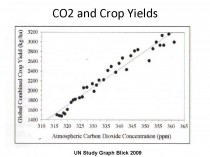
Enlarged here - UN graph from Blick
UPDATE: See here how Germany magazine sees the good from CO2 in a break from the mainstream media messaging.
See recent case here where biologist allegedly committed fraud in research that showed increasing CO2 diminished crop growth and ended interview when journalist asked tough questions.
Note: Highlighting the failure of last year’s Copenhagen climate summit, the report called for international commitment at events such as the U.N.-sponsored climate talks to be held in Cancun, Mexico, next month, “if we are to face up to what may be the most serious threat the world has ever faced.” according to the alarmists at grist here. In actual fact the UN and the liar scientists, economists, governments and enviro groups are the most serious threat the world ever faced. They must be exposed and stopped.
By Steven Goddard, RealScience
Peter Sinclair reels off one piece of misinformation after another in his monotone voice. Here are a couple of them.
Around time 4:40 he compares ice loss in the Arctic vs. ice gain in the Antarctic using percentages rather than absolute numbers. Perhaps he doesn’t realize that there is a lot more sea ice in the Antarctic, so the percentages are of course lower? When we measure the absolute extent of Arctic loss (red below) vs Antarctic gain (blue below) we see that they are currently about equal.
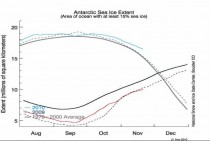
Enlarged here.
If a 100 pound person loses 10% of their weight, and a 500 pound person gains 2% of their weight, what is the net change in total weight? Zero. That is why people don’t report weight in percentages.
Then around 5:15 he goes completely clueless when he claims that northern sea ice anomalies occur in summer when the sun is high in the sky, but southern sea ice anomalies occur in winter when the sun is low. Perhaps he doesn’t understand that seasons are reversed in the southern hemisphere?

Enlarged here.
The Antarctic is three standard deviations above normal, and solar energy is at its peak - as seen in the green circle below. By contrast, the Arctic peak ice loss occurs in September when there is very little solar energy being received (red circle below.) Source: Earth Observatory

Enlarged here.
2010 ice took its dip starting in early September, when the Sun was very low in the sky (red circle above) so it actually acts as a negative feedback. The open water allows LW radiation to escape from the ocean, with minimal SW warming the water that time of year.
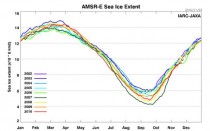
Enlarged here.
Another very important consideration is that excess Antarctic ice occurs at low latitudes where the sun shines directly on the ice, while Arctic deficiencies occur at high latitudes where the sun is oblique. The Antarctic positive anomalies have much more effect on the Earth’s SW radiative balance than do the Arctic negative anomalies.
At another point he claims that the Arctic is in a “death spiral” in spite of the fact that the minimum has increased by 20% over the last three years.
The amount of multi-year ice increased from 2008 to 2009, 2009 to 2010, and will undoubtedly increase again from 2010 to 2011. Some death spiral. See story and comments here.
Maurizio Morabito’s Omniclimate
Funny people, the climate scientists. One would expect, for example, that behind a website sporting a “new rapid response team of climate scientists [that] promises to connect reporters and editors with a team of experts” (in the words of The Guardian), there would be at least the one climate scientist ready to put their face where their internet connection is.
Alas, one would be wrong. For who’s organizing the Climate Rapid Response?
Dr. John Abraham, “Associate Professor of Thermal and Fluid Sciences at the University of St. Thomas School of Engineering.[1][2] His area of research includes thermodynamics, heat transfer, fluid flow, numerical simulation, and energy” (from Wikipedia)
Scott A. Mandia, “Professor of Earth and Space Sciences and Assistant Chair of the Physical Sciences Department [...] He received his M.S. - Meteorology from the Pennsylvania State University in 1990 and his B.S. - Meteorology from University of Lowell in 1987” (from Wikipedia)
Dr. Ray J. Weymann, “Staff Member Emeritus and Director Emeritus, Carnegie Observatories” (as far as I can tell, an astronomer)
As far as I can tell, the combined scientific output of the public faces of the Climate Rapid Response Team is zero. Or maybe one, by stretching things a bit.
This is not to criticize anybody, esp. Prof. Mandia, who after a couple of decades of teaching introductory climatology may know a thing or two, so to speak. But in absence of original research by its leaders, we can only expect the Climate Rapid Response Team to be a campaigning (political) platform, not a scientific one.
See blog here. H/T Marc Morano
Washington Examiner Editorial
According to the conventional wisdom, supplies will soon peak and then the U.S. will experience severe declines in the supply of oil and natural gas.Washington’s political class often seems impervious to changing facts. Case in point is the nation’s current and probable future access to essential energy resources, especially fossil fuels like oil, natural gas and coal. This trio of carbon-based fuels accounts for the vast majority of the nation’s electrical and other forms of power, and will continue to do so through at least 2030, according to the U.S. Department of Energy.
The United States is the world’s largest consumer of energy, but is also the world’s most productive economy, so demand here for energy resources is going to continue to grow for the foreseeable future.
According to the conventional wisdom, supplies will soon peak and then the nation will experience severe declines in the supply of oil and natural gas. Thus, the U.S. should invest billions in the development of renewable energy resources and use the power of government to create artificial consumer demand for them by imposing mandates for their use. Energy costs “will necessarily skyrocket,” to use President Obama’s memorable words, but that’s the price the nation must pay in order to achieve energy independence and protect the environment.
When the price of a barrel of oil hit $147 per barrel in July 2008 and Americans were paying as much as $4 per gallon for gas, that scenario seemed reasonable. But it turns out that in the years since, the energy market has experienced profound changes that negate the conventional view. As the New York Times recently reported, “Just as it seemed that the world was running on fumes, giant oil fields were discovered off the coasts of Brazil and Africa, and Canadian oil sands projects expanded so fast, they now provide North America with more oil than Saudi Arabia. In addition, the United States has increased domestic oil production for the first time in a generation.”
The significant news wasn’t restricted to oil. The Times also noted that “another wave of natural gas drilling has taken off in shale rock fields across the United States, and more shale gas drilling is just beginning in Europe and Asia. Add to that an increase in liquefied natural gas export terminals around the world that connected gas, which once had to be flared off, to the world market, and gas prices have plummeted.” The result, according to the Times, is that energy experts now predict decades of residential and commercial power at reasonable prices.”
In other words, the nation can look forward to abundant oil and natural gas supplies at affordable prices for decades to come. As Institute for Energy Research President Thomas J. Pyle puts it, “We can improve our economy, create jobs, and increase our supply of affordable, reliable energy in one fell swoop if the government allows businesses to look for and produce American energy.” Consumers should ask how much longer Washington will continue policies meant to restrict access to these resources. See editorial here.


